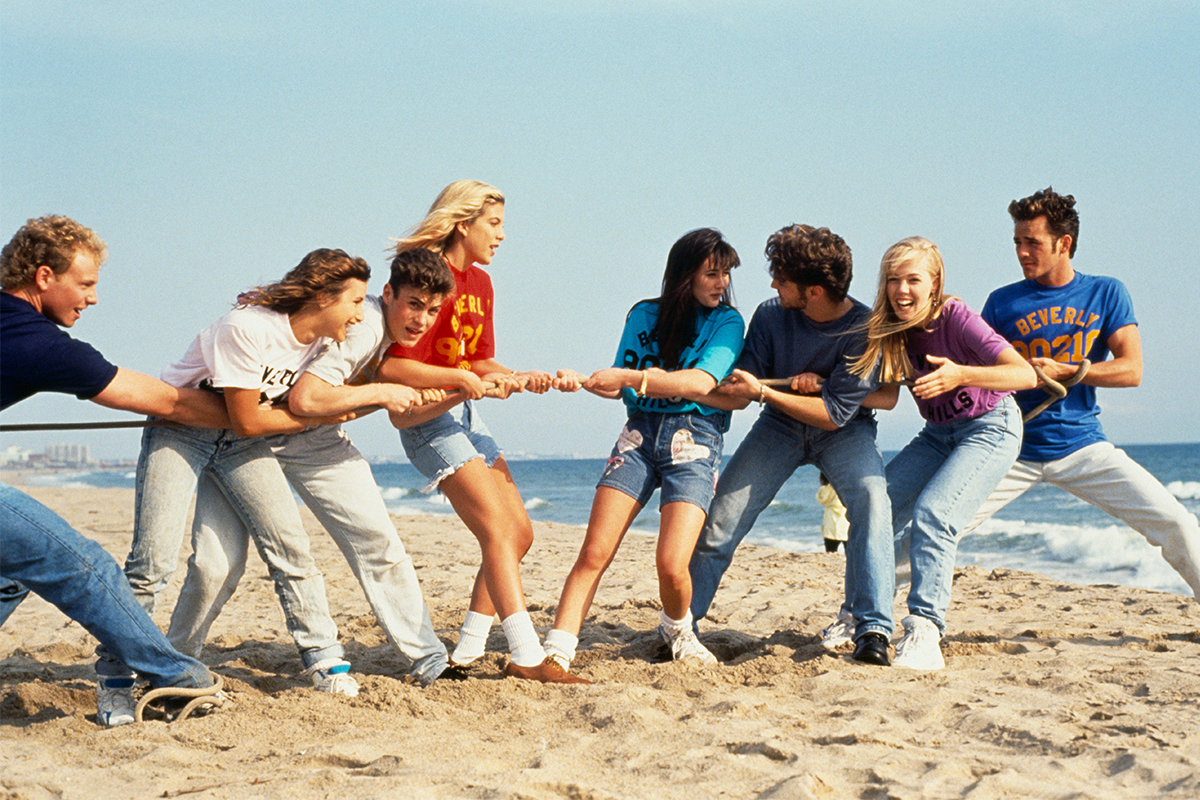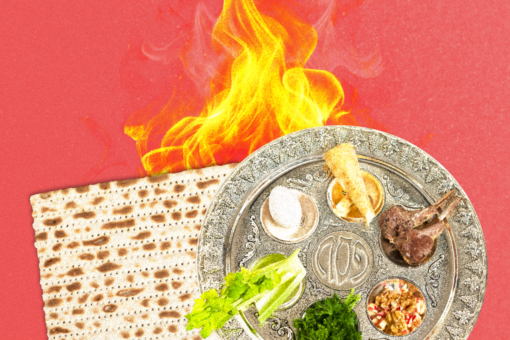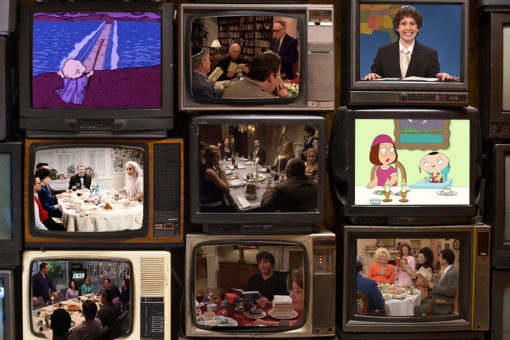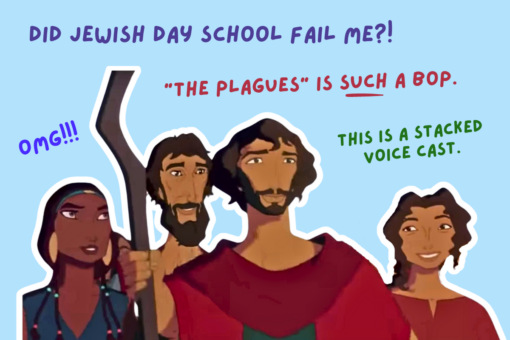The last place I expected to find something that reflected the tougher questions about being Jewish in America was on a teen show that premiered the year before I was born. But “Beverly Hills, 90210” did it, and did it well.
With all of the unexpected free time that quarantine offered, I decided it was finally time to watch the original “Beverly Hills, 90210,” a show that I had always thought of as “Saved by the Bell” but with more pregnancy scares. An instant hit when it premiered on Fox in 1990, the show is equal parts aspirational teen dramedy and after-school special. It centers on twins Brenda and Brandon Walsh (Shannen Doherty and Jason Priestley), Midwestern transplants who have just arrived at West Beverly High. They meet a cast of very good-looking and very rich characters with problems that only the privileged few can have.
But then there’s Andrea Zuckerman (Gabrielle Carteris), the overachieving, highly principled, glasses-wearing editor of the school newspaper. Andrea is Jewish and, unlike her peers, has not inherited a Scrooge McDuck-level of wealth. And she is not just a vehicle for bagels-and-schmear jokes — her Grandma Rose is a Holocaust survivor, and there are frank discussions about the horrors that she witnessed.
In fact, Jewishness is regularly addressed on “Beverly Hills, 90210” in a way that I have rarely, if ever, seen on mainstream television. In the third season, Brandon dates a pretty but bigoted girl named Brooke (Alexandra Wilson). Referencing the beach club where both Brandon and Andrea work, Brooke says, “I just don’t get why she works here, anyway. It’s not like she needs the money.” Brandon brushes it off, but she leans in, smiling: “Come on. Andrea Zuckerman.” Brandon’s outraged, but Brooke digs in, declaring, “No! … Jewish people are great with money. I meant it as a compliment.” Brandon shuts it down, explaining in no uncertain terms that it’s an ugly stereotype.
Brandon’s right: One of the oldest and most pernicious stereotypes out there is that “all Jews are rich,” but it’s so rare to see anyone on TV speak to the paradox that something “complimentary” can actually be harmful. And the fact that star hunk Brandon Walsh is speaking up on Andrea’s behalf is nothing short of revelatory — the burden of fighting antisemitism should not rest solely with Jews.
But it’s not just small scenes; “Beverly Hills, 90210” addresses antisemitism and Jewish identity in real, substantive ways. Episode 11 of the fifth season, “Hate Is Just a Four-Letter Word,” totally blew me away. It aired in 1994 and yet the issues it brings up around antisemitism, free speech, race and Jewish identity are stunningly relevant.
In the episode, the West Beverly High crew now attends the fictional California University, where Brandon is the acting student body president. The Black Student Union has asked Reverend Roland Turner, a character with a documented history of antisemitic speech — and who is likely a Louis Farrakhan stand-in — to speak at the school. Students from the Maccabee Center (the school’s Jewish center) are outraged and want the Student Senate to ban Turner from coming. The campus is soon roiling with protests and counter-protests.
The timeless debate of free speech vs. hate speech is in focus when Brandon asks Janice (Natalie Venetia Belcon), a representative from the Black Student Union, “What if a bunch of Nazi skinheads wanted to hold a rally right here in the quad, huh?” She responds, “At the law school we have a saying: ‘You’re either down with the First Amendment or you’re not.’”
The clash between the Black Student Union and the Maccabee Center is uncomfortable to watch, made all the more so because it reflects our modern reality: being a member of one marginalized community does not exempt you from being prejudiced against another.
Andrea becomes a lead supporter of the Maccabee Center’s attempt to block Turner, but her Grandma Rose (Bess Meisler) offers her a seemingly visionary call against cancel culture: “…in the Talmud it is said that if a man is an antisemite, he must be spurned, for he is too consumed with hate to listen to reason. But if someone like Dr. Turner is first a man who seeks the good of his community, and then is antisemitic, we must reach out to him for if given a chance, he will eventually see the error of his ways.” It’s hard to imagine anyone taking such a forgiving stance in our world today, but the message is inspiring: There will always be people who hate Jews, but those who are open to a dialogue deserve an opportunity to learn and grow.
Andrea has always been up-front about her Jewish identity, but it was the reaction of David Silver (Brian Austin Green) that struck me the most. David is the only other series regular who’s Jewish, but his Jewishness is almost never referenced. In the episode, when Andrea asks him to sign her petition against Turner, he tells her he’s “not really into politics.” Andrea says it’s not about politics and asks him how he can tolerate antisemitism. He responds, “Because being Jewish has never really been a problem for me… maybe it’s because I never made such a big deal about it.” Andrea’s furious, and can’t believe David’s ability to look away from what’s happening on their campus.
But now, especially after swastikas are graffitied on the facade of the Interfaith Center, David’s forced to confront the meaning of his Jewishness for the first time. He asks his girlfriend Clare (Kathleen Robertson), “What do you think of me being Jewish?” She replies, “I don’t know. I don’t really think of you as being Jewish. I don’t really think of you as being anything at all. You’re just David.” He says, “So it doesn’t really make a difference to you?” When she asks him back, “Does it make a difference to you?” he can only reply, “I don’t know.”
David’s struggle is with the choice — and whether it is even a choice — to identify as Jewish when you’re secular in the United States. It’s a struggle that’s difficult to articulate, and sometimes even to recognize, but I’ve certainly been there myself. The pull of assimilation is strong; the promise of a sense of belonging can be overwhelming. But when that means denying your heritage, where does it leave you? And is it even possible to shed your Jewishness in the eyes of others, or will you always somehow be “other,” whether you want to or not? I’ve never seen anything like it on primetime.
Of course, not everything in the episode aged well — I almost spit out my seltzer when Brandon suggests that Bill Cosby would have been a safer choice. But mostly I thought about how little has changed in almost 30 years. And how grateful I am to have stumbled onto such an unlikely exploration of Jewish American identity on “Beverly Hills, 90210.”
Late Take is a series on Alma where we revisit Jewish pop culture of the past for no reason, other than the fact that we can’t stop thinking about it?? If you have a pitch for this column, please e-mail submissions@heyalma.com with “Late Take” in the subject line.




